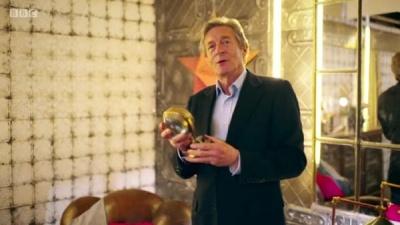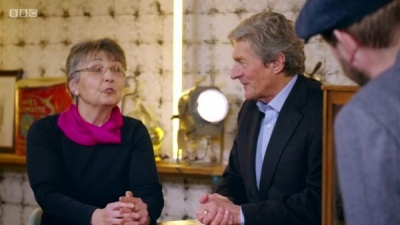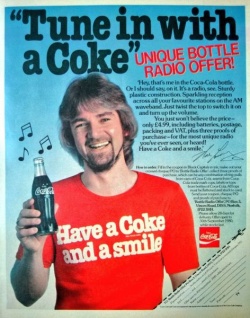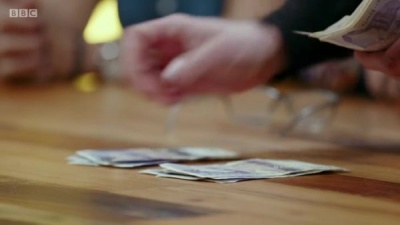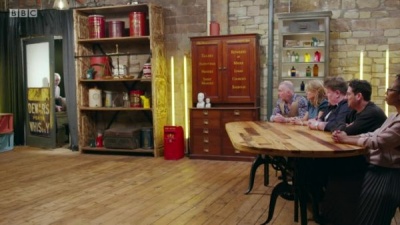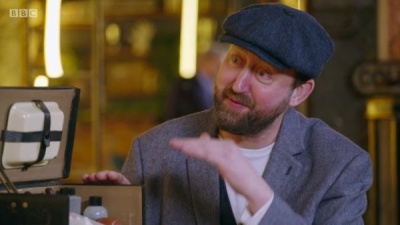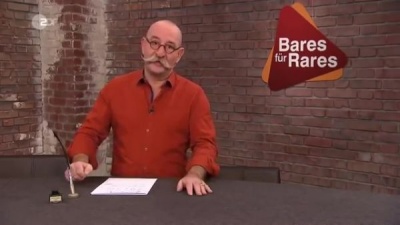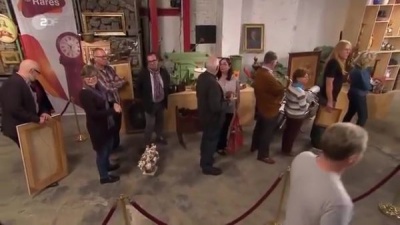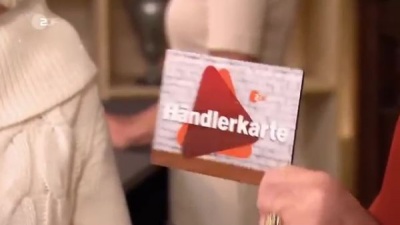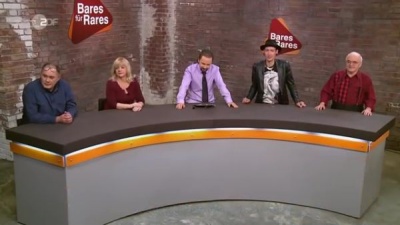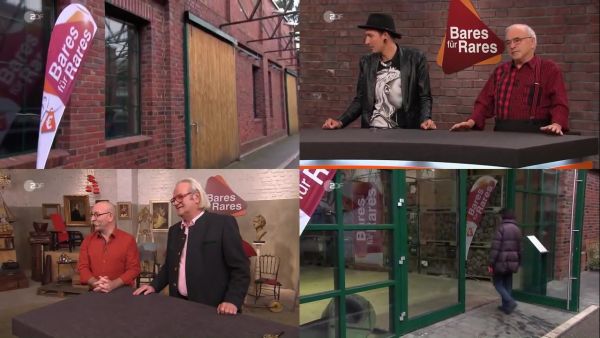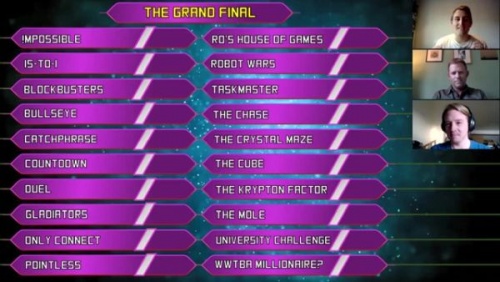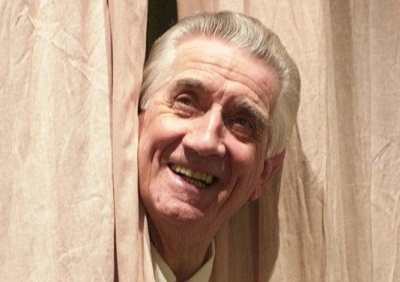Weaver's Week 2020-07-12
Last week | Weaver's Week Index | Next week
A little thriller in eight minutes, every time.
Contents |
The Bidding Room
Ricochet (a Warner Brothers Television Company) for BBC1, 8 June – 3 July
We set our course to Victoria Mills in Halifax where – guess what, folks! It's another antiques show!
How many shows about antiques and collectibles are on in daytime? There's the venerable Bargain Hunt, and its skeezy cousin Dickinson's Real Deal. There's Antiques Road Trip, and Flog It, Channel 4's got Find It Fix It Flog It and they've had French Collection. Over on the digital channels there's Cash in the Attic, and the grandaddy of them all Antiques Roadshow. And that's barely the list of shows on one Tuesday in mid-May.
What makes The Bidding Room different? It's not the host: Nigel Havers is affable, pleasant, charming – and he's not the star of the show. Nigel is here to be the anchor for The Bidding Room, a familiar and reassuring voice who will talk us through the programme, someone who will ensure we don't get carried away with ourselves.
The format is simple enough. Here is a vintage object, which someone might want to sell. The owner tells us about the object, what they know of it, how it came into their possession. There's always an engrossing anecdote to be told, even about the most mundane objects.
This column, for instance, might want to sell a radio shaped like a Coca-Cola bottle. The AM radio comes complete in its original box, and still works so long as we have fresh-from-the-packet batteries inside. The original price in 1980 was £3.99 plus three proofs of purchase – the ring-pull off a can, or the cap or label off a bottle.
Do we have an absorbing anecdote about our hypothetical object? No, but we do have an advertisement, featuring that Noel Edmonds.
Before we think about selling our item, we want to know how much we might get for it. The Bidding Room has a valuer on hand, Simon Bower. He'll talk about the item, what makes it particularly valuable. If there are hallmarks or other jewellery engravings, he'll explain them. Only after explaining his reasons does Simon come down on a price range – £20 to £25 for our example radio.
And now, we're off to the actual Bidding Room. We hand over our item, and have it examined by five of the resident experts. They discuss amongst themselves, and gently question the person selling the object.
When the discussion draws to a close, Nigel's voiceover recaps on the object, and reminds us of the valuation we heard a few minutes ago. As tinkly music starts, the five dealers bid amongst themselves for the object. The seller is allowed to talk during the bidding, and answer questions that arise, but they may not mention the price suggested by Simon.
This bidding bit is the heart of the show, and eventually we'll find that the dealers say they're out. The highest bid is the one that will be considered by the seller – but the seller doesn't have to accept. They have the option, even at this point, of picking their radio off the table, and taking it home with them. The decision is with the seller: £24 in cash, or a soft drink bottle to Little Noely's Breakfast Show on Radio 247. The buyers emphasise that we don't have to take the offer, we can still take the item.
The Bidding Room repeats this process, we'll typically see four items in the course of the show. Four items in a 43'30 programme, we're never going to spend more than ten minutes on any item. And with four distinct phases to each item, The Bidding Room maintains a crisp andante pace throughout. Tipping Point succeeds because we're never far from the next coin drop; The Bidding Room succeeds because we're always making progress towards the next round of bidding.
It wouldn't be a daytime show without some emotional heft, and The Bidding Room will often showcase good causes. We're not selling this item for our own enrichment, you understand, we're selling it to buy hopping lessons for Timmy our one-legged budgie. While this makes fantastic television, it all washes over the dealers and experts, they're only interested in buying something they can sell on to the next person for a suitable profit.
While the dealing panel is the same across an individual episode, the panel varies from show to show. Indeed, the panel change seats and outfits from one visitor to the next. There's no pretence that all of the episodes were filmed in one day, like on The Voice.
For our money, mixing up the panellists this much is an error. Thirty episodes is a fairly short run: not everyone will watch every day, and when we do tune in, we don't know which of the eight panellists we'll see. While all of the dealers will have been cast for their strong personality, that personality will be diluted from being in a room with four other people. That's the point of difference against Four Rooms, a format tailor-made for a huge personality like Jeff Salmon.
Had The Bidding Room stuck with the same panel of five throughout the series, they would have been the face of the show. They've chosen not to keep the panel static, which suggests they're trying to make Nigel Havers the star – or the format itself.
Make no mistake, we've watched four sample episodes of The Bidding Room, and we've enjoyed four sample episodes of The Bidding Room. It feels like a show that could find a quiet corner of the schedule and stick around until it's an appreciated fixture.
Bares für Rares
Warner Brothers International vor ZDF
That's what happened in Germany. Bares für Rares (literally: Cash for Old Things) quietly popped up on ZDF's late afternoon schedule in 2013. Through word-of-mouth and sheer tenacity and sustained excellence, it grew into the channel's biggest hit.
BfR was unlike any other antiques show. It was modest, it works with knick-knacks valued in the tens- and low-hundreds of euro. While other antiques shows went for the big-ticket items, BfR showcased the everyday and quotidian.
There are many editions of BfR on the interwebs, we've pulled one at random from November 2017. What changes have they made for the BBC edition? Horst Lichter is the host, a flamboyant older man with a distinctive handlebar moustache. There's a separate voiceover, provided by the gruff voice of Volker Wolf.
Gosh, they've got a proper title sequence. So many daytime shows on the BBC don't bother with title sequences, and The Bidding Room is one of them – it begins with Nigel Havers delivering the same two-minute speech explaining the show and previewing some of the events we're about to see. ZDF's show has been going longer, and can begin with the host making a joke to camera.
We see a bunch of people arrive in a hall, each clutches an item to be valued. Some of the more gripping ones will make the television show, where they use specialists in each field, rather than Simon with his broad general knowledge.
The seller has a price in mind, and the specialist gives their valuation. Only if the two align will the seller get a Händlerkarte. When the specialist reckons the seller is asking far too much, the item will go no further. This tends not to make the final edit too often, and it's an additional complication to the format. Even though it's the most gameish element of the programme, they were completely right to ditch it for the BBC version.
The ZDF show still features a Händlerraum, a panel of five people, now standing around a curved desk. Unlike our show, their viewers are trusted with captions – sometimes to give additional information about the collectible being sold, or the price named by the valuer. ZDF viewers are also trusted to use their memory: we see two items valued, then both are sold.
The panel is somewhat more stable than we've seen here. The first series featured the same five dealers throughout. The second series kept four of the dealers, added another and had those five throughout. Not until the sixth run of episodes – three years after Bares für Rares debuted – did we see as many dealers as on the BBC. A consistent set of characters gives us an extra reason to tune in, what will Fabian be wearing this afternoon?
We repeat the whole process three times, neatly filling ZDF's daytime "hour" (about 50 minutes of show, somewhat more than the BBC gives). Throughout, the show's logo – Bares für Rares in a red triangle, almost overlapping an orange triangle – decorates the set. It's behind the bidders, it's on the wall in the valuation room, it drills into our eyes.
As it is, The Bidding Room is a valiant attempt to translate Bares für Rares for an Anglophone audience. It keeps the crux of the show – selling items for cash, being friendly and polite and light. We get an added note of "you can always walk away", less explicit in the German shows we've seen. We keep the German cultural touch of buying for a few hundred euro (or a few hundred quid) in cash. Handing over cash makes for much better television than transferring money to your account.
Reviews of Bares für Rares compared it to a ritual experience. "Quite a few viewers appreciate this because they are used to the uniformities of their lives and interpret it as reliability," wrote Hans Hoff. "A hidden pearl of the horror genre disguised as reality entertainment," according to Der Standard. Horst Lichter noted, "With the beautiful old things you have something valuable – and sometimes it's just the story behind it that's valuable."
To become a touchstone in the culture, you've got to be in the right culture. Pointless and The Chase became massive over here because they fitted into a vacant spot. We didn't know we wanted a fundamentally nice quiz we could dip into, but once we saw it, we collectively loved it. Bares für Rares filled that spot for German culture, a low-stakes show where the emphasis is more on the human interest as on the money. It's had a small number of primetime and celebrity editions, just as our quizzes occasionally slip into the mainstream.
The Bidding Room probably won't be as huge a hit over here, Gefragt Gejact isn't a huge hit for German-speakers. And that's absolutely fine: if all cultures appreciated exactly the same things, they wouldn't be different cultures. The Bidding Room is a good show, done well, and we can see many viewers loving it.
In other news...
The People's Top Game Shows has completed its series, with the grand final. Ben Justice, who has been running this event like a complete hero, put together a 90-minute marathon video, filled with game show experts trying to predict which will be the next show out. Which show will win? We'll tell you... eventually.
Great news from Junior Eurovision, where KiKA has signed up to take part. The German children's broadcaster – a collaboration between ARD and ZDF – will debut at this November's contest in Warsaw. For the first time, we expect all of the Big Five to be represented – France Télévisions, TVE, and S4C have been going for a few years, hoping to emulate RAI's victory in 2014.
Channel 4 have spoken about their new shows. Taskmaster arrives on a big money transfer from Dave, with ten episodes lined up. They also speak of other programmes, none of which appear to be much of a game. From the fandom, we understand that Countdown starts recording again soon, and should be back on air in about a month's time.
The BBC tells us about I Can See Your Voice, where pairs try to predict who can sing well and who is as rubbish as this column. Celebrity experts try to pick up on clues as the performers lip sync to other people's songs, before the chosen singer gets to perform. If this show sounds familiar, it originates in Korea; it turns out to be a few weeks older than King of Masked Singer, which did good business here a few years ago at the start of the year. Fremantle labels Thames and Naked combine on the BBC's version, set to air in the new year.
Some news from the red white and blue, where their version of I Can See Your Voice will air later in the year. Hardspel with Richard Groenendijk began last weekend, it's a version of SBS's Hard Quiz. Hardspel is not to be confused with De S.P.E.L.Show, a quiz of spelling and language.
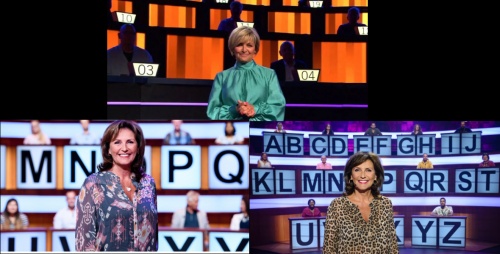 Physical distancing on Dutch shows: compare De S.P.E.L.Show last year (bottom left) with the same show and Één tegen 50 (top).
Physical distancing on Dutch shows: compare De S.P.E.L.Show last year (bottom left) with the same show and Één tegen 50 (top).
A new series of Één tegen één hondred (1 vs 100) began last weekend on Dutch-language channel RTL4. It's a different game this year; in order to meet physical distancing requirements, only half the hundred are seated in Één tegen vijftig. There's a subtle change to the rules, as players only get two escapes (50% and 75%), the first "dodge" has been dodged. The jackpot prize is still substantial, last Sunday's edition saw Lars win €91 492.
Over in Leftpondia, they've commissioned a new series of The Weakest Link. The role of Anne Robinson will be played by Jane Lynch, who you'll remember as Sam Puckett's mother in iCarly. The role of Voice Of The Statistics has yet to be cast, but we hope it's played by someone more awake than the droning, monotonous voice they had last time.
The death of Johnny Beattie, Scottish comedy legend and sometime host of STV's Now You See It.
Best of the Web: The ever-readable Dirty Feed has a meditation on the Knightmare life force clock.
Financial news, and the conglomeration of all game show production companies continues. Banijay has bought up EndemolShineGroup, the ludicrously-capitalised group formed by the merger of Endemol and Shine. The newly-merged company now owns shows as diverse as Spy School, The Crystal Maze, Big Brother, Pointless, Deal or No Deal, and Don't Scare the Hare.
After much speculation, we've heard word that Official 20th Best Game Show Of All Time The Cube is coming back. The big change: they're now asking for pairs of players, rather than individuals.
With the nights drawing in, and the weather taking a turn for the worse, some familiar shows come back. Official 19th Best Game Show Of All Time University Challenge begins its 50th student series (BBC2, Mon).
Promoted into primetime, Glow Up (BBC2, Thu) finds another excellent make-up artist. Those of us with a passing knowledge of Dutch might enjoy The Smartest Person, De Slimste Mens (bvn.tv, weeknights).
Photo credits: Ricochet, Radio Times, Warner Brothers Television, Ben Justice, BNN/VARA, one of the Baninjay-Endemol-Shine companies, STV.



